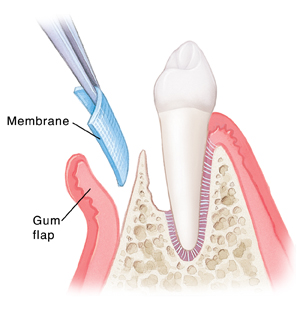
Periodontal disease is the receding of the gum and bone tissue from the teeth caused due to a bacterial infection. Prompt diagnosis of this disease followed by some of the most effective regenerative procedures can stop its progression and save the teeth from damage.
About regenerative procedures
Regenerative procedures fold back the gum tissue and remove disease-causing bacteria. Tissue stimulating proteins, bone grafts and filters or membranes are used to boost the body’s natural ability to regenerate tissue and bone. You can consult the best dentist in Mumbai to know your options.
Who qualifies for regenerative procedures?
The best dental doctor in Mumbai may suggest regenerative procedures for people suffering from periodontal disease. Such procedures can reverse the damage caused to the bone that supports the teeth by regenerating lost tissue and bone.
Why are regenerative procedures conducted?
A dental specialist in Mumbai performs regenerative procedures to stop the progression of periodontal disease. Such procedures regrow the bone and gum tissue by eradicating existing gum disease-causing bacteria. They also reduce pocket depth and let the tissue repair itself.
How are regenerative procedures conducted?
When performing regenerative procedures, a dental surgeon in Mumbai takes the following steps:
- Cleans the periodontal pockets by folding back the gum tissue and eradicating bacteria.
- Inserts re-absorbable membrane between the pocket and tissue, letting the body regenerate gum and bone tissue.
What are the different types of regenerative procedures?
The different types of regenerative procedures include:
- Bone regeneration to promote the growth and thickness of the jawbone
- Gum tissue regeneration to reshape the gum line symmetrically
- Pocket reduction surgery to reduce the depth of gum pockets and make it difficult for bacteria to enter the gum tissue.
- Root planing and scaling to remove calculus and plaque from above the gum line
What are the benefits of regenerative procedures?
Major benefits of regenerative procedures are:
- Eradicating existing bacteria from the mouth and regenerating tissue and bone helps repair damage and reduce pocket depth caused due to periodontal disease.
- Chances of other associated health problems are decreased.
What are the risks or complications of regenerative procedures?
Common complications of regenerative procedures are:
- Allergy
- Anticoagulation
- Immune suppression
- Systemic bone disease
Conclusion
Regenerative procedures involve a complete restoration of the lost teeth structures. However, this is not always possible in the case of periodontitis. So, consult the best dental hospital in Mumbai to get a particular regenerative procedure customised to your requirements and know more about oral hygiene before and after the procedure.
Get in touch with the best dental clinic in Mumbai for quality dental care. Request an appointment at Apollo Dental, Chennai. Call 1800 1020 288 to book an appointment OR click on this link.
Re generative procedures, especially the ones after tooth extraction, definitely work and help restore bone and tissue. This protects the mouth from further damage.
Implants require an adequate amount of bone for proper support. For the patients who can benefit from replacing missing teeth with implants, regenerative procedures might be recommended.
The reusable, bio-based, non-critical, and non-toxic materials used in different regenerative procedures are called regenerative materials. Nevertheless, these materials can vary from one dental clinic to another.


















































